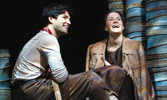Festival's 'Fury' misses the mark in premiere
BY DENNY SCOTT
Fury, the third of the four main-stage plays at the Blyth Festival sought to tell an incredible local story however it missed the mark in several ways.
The play, based loosely around The Great Storm of 1913 that saw Lake Huron become the grave of hundreds of sailors, features the talents of actors Rachel Cairns, Jeff Irving, Keith Barker, Jason Chesworth and David Fox under the direction of Micheline Chevrier. The group is tasked with bringing the vision of Peter Smith and the score from Samuel Sholdice to life, however there are some hiccups along the way.
First and foremost is that the storm, which was billed as central to the plot, was but a moment in the play. This oft-forgot piece of nautical Huron history was made fresh in the collective local memory with the discovery of The Wexford in 2000 and the 100th anniversary of the storm two years ago. With such great source material, it’s disappointing that the storm played little more than a brief means to an end in the story (that being the end of several characters).
With all the news of the play’s development focusing on music and the history of the event, both felt underused. The music seemed decent, but the lyrics were at best, forgettable.
Had the play been set in any other place, or been at any other theatre across the country, there may not have been such a problem but, when sourcing locations such as Goderich’s harbour, Carlow and every small village around the area, there needs to be more of an emphasis on the actual history, rather than the deadpan humour that became the trademark of Margaret, played by Cairns.
The opening scene features David Fox playing a secondary role as a bare-knuckle boxing event organizer, or so it seems. Fox, who is yelling loudly and trying to maintain an accent, can barely be understood.
The scene introduces Irving’s Michael and Barker’s Bernard.
Irving is handed a tough range of emotions to play through in the act. His character goes from a ruffian and a drunk to a romantic and then to a petulant child angry that he lost his love and ready to take it out on (supposedly) his only friend, Bernard, a narcoleptic boxer-turned-sailor (which, while humorous, stretches credulity just a bit too much).
Barker, despite his character’s unlikely traits, has a presence on the stage that should have been given more time. If the storm and the sinking of the Wexford had been given its due, Bernard could have proven to be a more likable character.
While Irving’s Michael undergoes several different emotions, beneath it all is a devil-may-care attitude that is never tempered, indicating no growth.
Cairns, whose character is stuck between the ruffian she grows to love and the suitor she is forced to marry by her uncle, the judge (played by Fox), is at the opposite end of the spectrum.
Within one scene, her portrayal of Margaret changes from providing deadpan responses in every situation, including romantic ones, to a fiery, empassioned character. While the growth is necessary and welcome, it felt more as if it was a light switch being flipped on instead of a gradual progression.
While some might say that the wooing of the proper girl by the ruffian from the wrong side of the tracks (or Carlow, in this case), is a classic device, cliché may also apply.
The stage design was well done and helped to bring the Wexford to life thanks to world-renowned puppeteer Ronnie Burkett. Featuring a ship’s prow that doubles as Margaret’s view of the harbour during scenes on land, the set lent itself perfectly to the story – Burkett was an excellent choice for the show.
The show feels like it could have benefitted from another year or so of development prior to making its way to the stage.
Fury continues through Sept. 12 and tickets are available through the box office at 1-877-862-5984 or online at blythfestival.com


